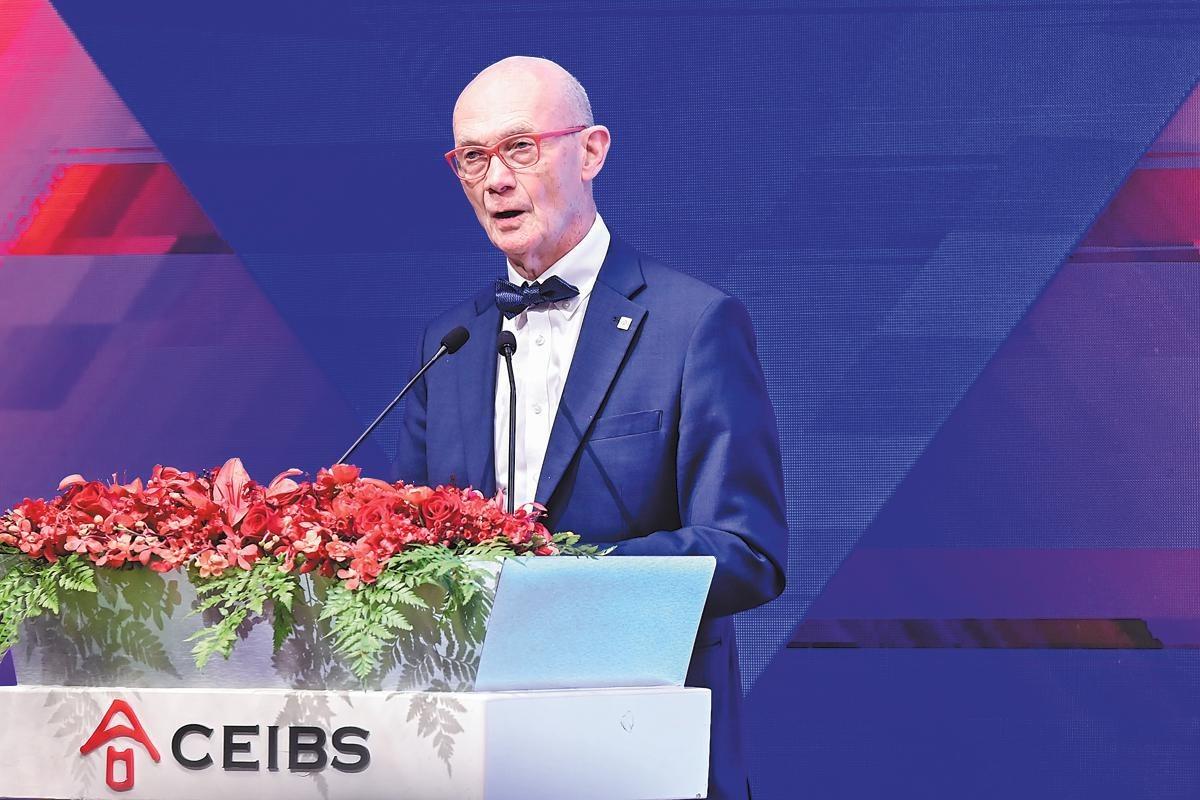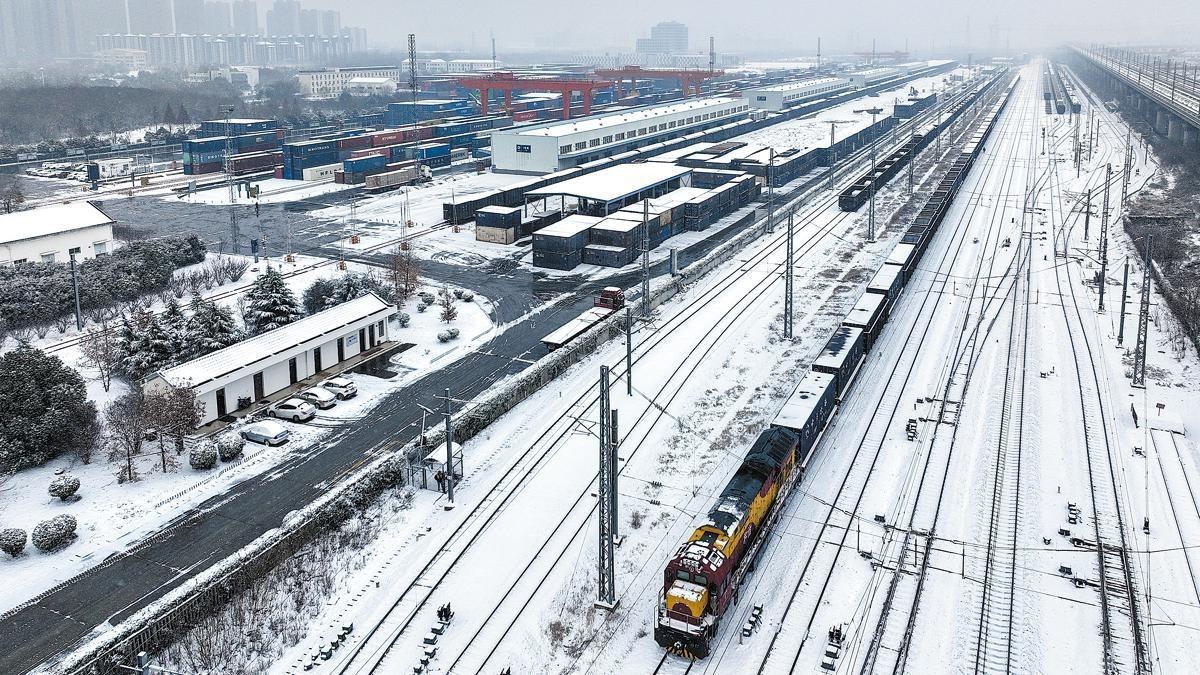 Pascal Lamy, former director-general of the World Trade Organization, gives a lecture on globalization at the China Europe International Business School in Shanghai, China, on Dec 15, 2023. (PHOTO / CHINA DAILY)
Pascal Lamy, former director-general of the World Trade Organization, gives a lecture on globalization at the China Europe International Business School in Shanghai, China, on Dec 15, 2023. (PHOTO / CHINA DAILY)
Former WTO chief: Technology, ideology, peace key to pushing open world economy
Though facing challenges such as increasing geopolitical tensions and turmoil brought on by shifts in global economic dynamics, the world will likely avoid an era of de-globalization but will instead see the pace of globalization slow amid a more secure new phase, said Pascal Lamy, former director-general of the World Trade Organization.
"We are in a period of turbulence and living in a time of change in globalization. It's a big inflection that we are witnessing," said Lamy.
Speaking at the China Europe International Business School last week in Shanghai, Lamy said there are three major engines powering globalization — technology, ideology and peace — adding that the world is seeing changes in all these factors amid a different phase of globalization.
ALSO READ: Rebooting globalization for greater good
The development of technology has reduced the cost of distance and other obstacles to trade. Distance is one of the key factors in globalization, and as technological development brings advances in transport, it significantly enhanced efficiency in global trade and boosted globalization, he said.
It's more difficult to address core issues in today's era than ever before because there are many disruptive factors. The key is to establish more uniform regulations, whether in terms of global trade or climate change.
Pascal Lamy, Former director-general of the WTO
"Technology keeps pushing globalization. This world is interconnected, more and more every day. So there is a huge potential for further globalization, notably in services with digitalization."
Along with the continuous development of technology, the world is also witnessing a changing ideological picture.
Twenty years ago, the world's ideological consensus was that opening trade was the way to go, because of the merits of international division of labor, specialization, multi-localization of production systems and global supply chains, he said.
Nowadays, the ideological landscape has shifted.
ALSO READ: Collaboration key to tackling deglobalization pressures
"In today's ideological picture, the relationship to trade is much more mixed. You hear people saying trade should be reduced for reasons of national security. And you hear people saying trade should be reduced for reasons of social security or environmental security," Lamy added.
"Environmental security" was highlighted by Lamy in his speech, as it is an emerging factor leading to trade friction when the world is seeking to decarbonize and strengthen economic foundations.
On the climate governance front, more efforts are needed to realize proportionate efforts of responsibilities for industrialized and other countries in order to reduce carbon emissions, support adaptation, phase out carbon emissions and conduct better geoengineering research. A better system of climate divergence is needed to reduce discrepancies among climate-related trade measures, the former WTO chief said.
 A train of the China-Europe freight train service is seen parked at a station in Hefei, Anhui province, China, on Dec 18, 2023. (PHOTO / CHINA DAILY)
A train of the China-Europe freight train service is seen parked at a station in Hefei, Anhui province, China, on Dec 18, 2023. (PHOTO / CHINA DAILY)
In addition, the multiplying and expanding geopolitical tensions, such as the Russia-Ukraine conflict, are exacerbating worldwide turbulence and taking a toll on geoeconomics and globalization as well.
READ MORE: Deglobalization and decoupling risk causing more global damage
"In the past, these three drivers moved toward the same direction, which largely facilitated global trade and economic development. But now, some of these 'winds' are blowing in different directions due to the rise of geopolitical conflicts, more fragmented ideological differences about the benefits of openness, and the risks of fragmentation in the digital age," Lamy said.
However, despite the challenging conditions, Lamy still believes the world is not entering a "de-globalization" trend, but into "a different phase of globalization", as international trade still keeps growing, as seen by record 2022 trade volume statistics.
According to a WTO report, in volume terms, global merchandise trade rose 2.7 percent year-on-year in 2022, with services trade growing 15 percent.
"I still believe that these engines will keep pushing for globalization," said Lamy.
In terms of the future path, Lamy said the world is in a process of "slowbalization" and its patterns would be increasingly influenced by security requirements, or "paranobalization".
READ MORE: Chinese firms transforming global business via technology
"We should try to ease geopolitical tensions and rebuild trust through high-level dialogue leading to progressive confidence measures in Sino-US relations," said Lamy.
In an exclusive interview with China Daily, Lamy said he was also happy to see conversations and talking channels being built between China and Europe, as several senior European leaders recently paid visits to China.
On Dec 7, the 24th China-EU Summit was held in Beijing, where an in-person meeting between Chinese and European leaders was held again after a four-year hiatus.
"Although we have differences and tensions, there are areas where the EU and China could keep cooperating. And I think we can do more," Lamy said.
"China and Europe have a lot in common in terms of dealing with the environment, which is a very good starting point. We can help build a more coherent environmental governance system where China draws lessons from the EU's regulatory experience, including in carbon pricing, and the EU learns about the successes of China in rapidly developing its impressive green technologies."
READ MORE: IMF, WTO leaders warn don't 'pull the plug' on global trade
With the aim to contain the risk of further divisions and navigate global turbulence, Lamy also attached significance to the role that international organizations, such as the WTO, should play in pursuing joint efforts and reshaping the new phase of globalization.
"International organizations are important to frame disciplines and organize international systems. It's more difficult to address core issues in today's era than ever before because there are many disruptive factors. The key is to establish more uniform regulations, whether in terms of global trade or climate change."


